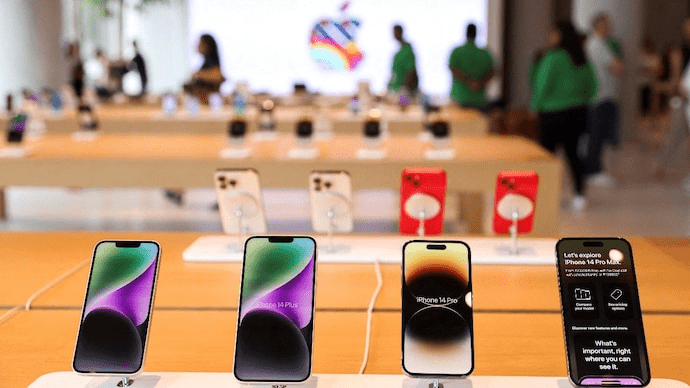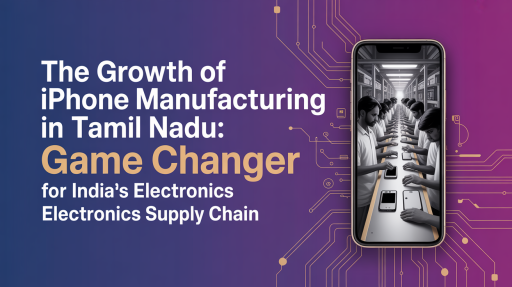The rise of Tamil Nadu as India’s ‘iPhone capital’ marks the nexus of global technology production, driven by the rapid growth of iPhone manufacturing in Tamil Nadu. Over the past few years, the region has seen a significant increase in production, accounting for around 16-17% of Apple’s global output in 2024—a figure projected to double by 2026-27..
This rapid growth signifies that the high-value electronics supply chain in India is emerging as a strong and competitive ecosystem.
The Emergence of iPhone Manufacturing in Tamil Nadu
Infrastructure investment and policy support have been the foundation of iPhone manufacturing in Tamil Nadu. Major players like Foxconn, Pegatron, and Tata Electronics have established huge plants in Sriperumbudur and Hosur. Today, iPhone manufacturing in Tamil Nadu accounts for 70-80% of India’s total iPhone output. With a clear vision and the foreseen increase in production, the state government has been expanding industrial housing, training labs, and utility amenities, such as tertiary treated water.
In addition, under its Naan Mudhalvan initiative, the state is preparing a skilled workforce for advanced employability, thereby insulating the electronics supply chain in India around the manufacturing capacity of Tamil Nadu.

Momentum in the Electronics Supply Chain in India
The growing electronics supply chain in India is as much about local capabilities as it is about global integration. The Apple Production Linked Incentive (PLI) scheme is prodding both domestic and foreign firms to invest in India. A significant increase was witnessed in Indian exports of iPhones, which nearly doubled between 2022-23 and 2023-24. According to Trade Vision LLC, Apple’s exports were close to USD 6.27 billion and USD 12.1 billion in those years, respectively.
Apple has now initiated the ‘New Product Introduction’ (NPI) for the iPhone 17 in India. This was previously exclusive to China. It reflects how India’s electronics supply chain is maturing, especially in high-end R&D and quality control.
Scale and Strategy: Why Tamil Nadu Leads
Several strategic elements differentiate iPhone manufacturing in Tamil Nadu:
- China-Plus-One Positioning: Tariff pressures and geopolitical shifts are prompting Apple to diversify production. After Tim Cook met with PM Modi, it was revealed that in the June quarter of 2025 and afterwards, almost all iPhones sold in the US were sourced from India. It is now required to double iPhone manufacturing so that Tamil Nadu can service the US and other market demands (around 8-8.5 crore units/year).
- Schema of Scale: India currently assembles 4-4.1 crore iPhones annually, or roughly 16-17% of global output. By doubling production, Tamil Nadu could account for more than 35% of Apple’s global production by 2026-27.
- Rear Component Ecosystem: Foxconn is also extending beyond final assembly and is now making iPhone casings in Oragadam, Tamil Nadu—the first of its kind in India. A host of indigenous players like Tata are ramping up chassis and camera-module supply, further integrating the electronics supply chain in India.
- Skilled Workforce & Infrastructure: Tamil Nadu has implemented various programs, including dorm housing for 18,500 female Foxconn workers and thousands of new beds in various locations, industrial training labs, and support programs—all consolidating iPhone manufacturing capabilities in Tamil Nadu.
Implications for the Electronics Supply Chain in India
The scale-up of iPhone manufacturing in Tamil Nadu is reshaping the electronics supply chain in India in several ways:
- Vertical Integration: As component production—for example, casings, displays, batteries, and camera modules—localizes in Tamil Nadu, India’s supplier base strengthens.
- Export Growth: Smartphone exports from India soared over ₹2 lakh crores (~US$24 billion) in FY2024-2025, largely on the back of volumes attributed to iPhones.
- Global Supply Resilience: By diversifying iPhone production from China to Tamil Nadu, Apple is building redundancy into its supply chain, which is crucial to its global strategy.
- Policy Success: Government incentives—from PLI to semiconductor subsidies—are beginning to yield results. Tamil Nadu recorded US$5.37 billion in electronics exports in 2023, representing a 233% increase year-on-year.
Find all of our books here.
Looking Ahead: Doubling Output by 2027
So what comes next? iPhone manufacturing in Tamil Nadu is gearing up for mass production of the iPhone 17, with trial runs slated for July 2025 and full-scale production anticipated from August. Analysts believe production can hit 60 million units (~6 crores) in FY 2025-26, a major increase from 35-40 million in 2024-25.
As Apple shifts more of its production to Tamil Nadu, it is strengthening India’s electronics supply chains. New fabs, R&D centres, and supplier hubs are emerging. Tamil Nadu aims to capture 25% of the national electronics manufacturing market, estimated at US$100 billion by 2025.”
Find the Best Idea for Yourself With our Startup Selector Tool
Conclusion
Tamil Nadu’s transformation into an iPhone manufacturing hub is helping to revolutionize the electronics supply chain of India. With local factories assembling core iPhone models, launching NPI processes, and providing an integrated component ecosystem, Tamil Nadu is emerging as a major contender in the global industrial race. The way ahead ensures economic growth, export power, technological development, and supply chain durability.
India, and especially Tamil Nadu, are no longer far-off regions in Apple’s plans. They are fast becoming a central pillar of iPhone Manufacturing in Tamil Nadu and the broader Indian electronics supply chain.
For more information, check out this Related video.
Frequently Asked Questions (FAQ)
Q1. Why is Tamil Nadu called India’s iPhone capital?
A1. Tamil Nadu today produces 70-80% of India’s iPhones, contributing about 16-17% of Apple’s global output in 2024. This share is expected to double by 2026-27, making it a central hub for Apple’s global supply chain.
Q2. Which companies are making iPhones in Tamil Nadu?
A2. Major Apple suppliers like Foxconn, Pegatron, and Tata Electronics have huge factories in Sriperumbudur and Hosur. Foxconn is also now making iPhone casings in Oragadam, a first for India.
Q3. What policies and support helped iPhone manufacturing in Tamil Nadu grow?
A3. Factors include:
- Government incentive schemes like PLI (Production Linked Incentive).
- Strong state infrastructure (dorm housing, training labs, water, and utility support).
- Skill development programs like the Naan Mudhalvan scheme that train workers.
Q4. How does this growth help India’s electronics supply chain?
A4. It improves vertical integration (local production of casings, modules, batteries), boosts exports (₹2 lakh crore from smartphones in FY 2024-25), ensures global resilience by reducing dependency on China, and shows policy success with rising FDI and exports.
Q5. What is “NPI” and why is it important?
A5. NPI (New Product Introduction) means new iPhone models are first trial-produced in India before their global launch. The iPhone 17 NPI trial runs are happening in Tamil Nadu in July 2025. Earlier, this process happened only in China, so it shows India’s growing capability.







